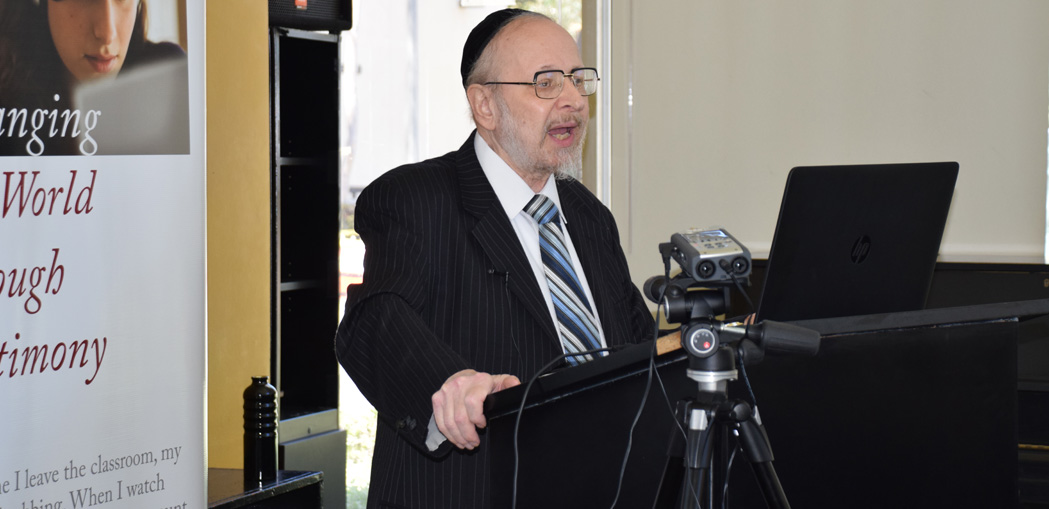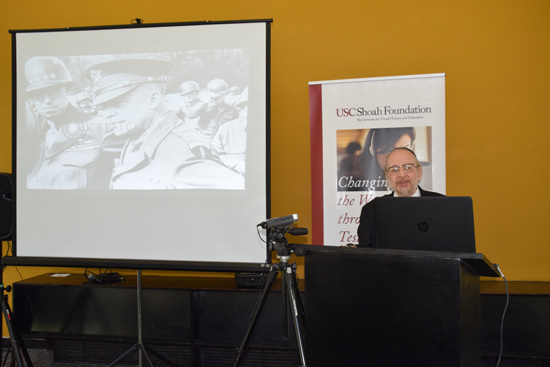Rutman Teaching Fellow Harry Reicher Delves into the Visual History Archive


Harry Reicher, USC Shoah Foundation’s first-ever Rutman Teaching Fellow, wrapped up his four-day fellowship today with a talk that revealed how exceptionally valuable the Visual History Archive will become to his teaching.
The Rutman Fellowship provides funding and support for a professor at the University of Pennsylvania to spend a week at the USC Shoah Foundation in Los Angeles to learn how to incorporate the Visual History Archive into his or her teaching.
Reicher has already developed and taught a course at Penn Law called Law and the Holocaust. The course examines the Nazi philosophy of law and how it was used to pervert Germany’s legal system in order to discriminate against, ostracize, dehumanize, and ultimately eliminate, certain classes of people; and to study the role of international law in rectifying the damage by bringing perpetrators to justice and constructing a legal system designed to prevent a repetition.
The course utilizes a variety of audio-visual material, including documentary and feature films and archival footage, to explore the Nuremberg Laws, Nazi ideology, war crimes trials and other legal aspects of the Holocaust.
Reicher began his talk on Thursday, his last day in Los Angeles, by sharing his philosophy when it comes to teaching about the Holocaust: A picture is worth a million words. What happened during the Holocaust is so far outside our range of normal human experience that we can’t conceive of it, he said – unless we can see it for ourselves.
He gave several examples of some of the concepts he teaches in his class and how he illustrates them with archival, feature and documentary film clips, including Nazi propaganda film Triumph of the Will, film of the liberated Orhdurf concentration camp and the 2002 feature film The Pianist.
Reicher also showed archival footage of Roland Freisler’s infamous trial of the men who carried out the attempted plot to assassinate Hitler, illustrating how Jews and political dissidents were treated by the Nazi legal system.
Finally, Reicher turned to the laws which made it illegal for Jews to go to school, work, visit public places, and more, commonly known as the Nuremberg laws. This brought him to the Visual History Archive and how he will incorporate testimony clips into his course. Up until now, there has been a gap in his curriculum: how to illustrate, through pictures and film, the human element of Jews’ disappearing rights in the years leading up to the Holocaust.
With help from USC Shoah Foundation staff who taught him how to use the Visual History Archive, Reicher said he was fascinated by what he found in the testimonies and exhilarated by the experience of working with them.
“The detail which emerges about law in practice in the real world was extraordinary,” he said. “I’ve been working in law and the Holocaust for 15 years, and there are things I saw [in testimonies] yesterday which brought to life theory I had read about.”
For example, in one testimony, a survivor talked about finding out that she and the other Jewish children in her class were not allowed to go to school on Saturdays anymore. Reicher was struck by the fact that the law made her realize for the first time that she and others in her class were Jewish, and how she and the others coped by organizing their own activities to do on Saturdays. Another testimony revealed how upsetting it was when a survivor’s father was fired from his university and she was forced to leave the trade school she attended.
These are just two examples of how each testimony is a “treasure trove” that reveals how Nazi laws and ideology affected ordinary people, Reicher said. Now that he has watched testimony and learned to use the Visual History Archive, his courses will never be the same.
“This sort of visual testimony brings so many nuances and details to life. You can’t get the same thing in a memoir, book or diary,” Reicher said. “A whole new world has opened up [for me].”